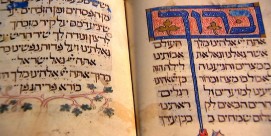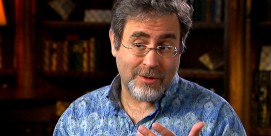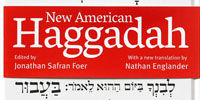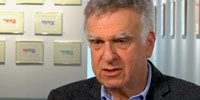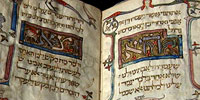Tag: haggadah
The haggadah is the book that guides Jews through the ritual of the Passover Seder, the meal commemorating their ancestors’ exodus from slavery in Egypt. The Sarajevo Haggadah is famous for its artistically illustrated manuscript pages. Created 600 years ago, “It went through so many different cultures,” observes composer Merima Kljuco, “and so many different people took the care of the book and helped it survive.” More
“The central moment in Passover is the use of the material—the use of the tools we have with us in the world to bring us to another place.” More
“New Haggadahs will be written until there are no more Jews to write them. Or until our destiny has been fulfilled, and there is no more need to say, ‘Next year in Jerusalem.'” More
“This haggadah is trying to draw in as many people as possible to participate in the service,” says artist Mark Podwal, who describes his illustrations for the text. “For me,” says Podwal, “my art is prayer.” More
“For symbols related to spring…I have flowers growing out of a menorah. I have the fruits of Israel. I have two pomegranates with Torah shields…so that each pomegranate is a mini-Torah.” More
Rabbi Sharon Brous, founder of IKAR, a Jewish spiritual community in Los Angeles, says Passover is “the centerpiece of the Jewish moral imagination and the Jewish collective memory.” More
“The idea that it’s possible to move from slavery to freedom and from darkness to light and from despair to hope—that is the greatest Jewish story every told.” More
For over 50 years, a family of New York City philanthropists has commissioned prominent artists to interpret Passover themes for the extended family’s annual seder, and now some of the remarkable results are available for all to see at the New York Public Library. More
“The freedom that is so important in the Passover story, in the Haggadah, is something that doesn’t belong to a specific time period 3,000 years ago…There’s a fresh message available to be garnered from the Passover story no matter when or who is looking at it,” says David Wachtel of the Jewish Theological Seminary in New York. More

